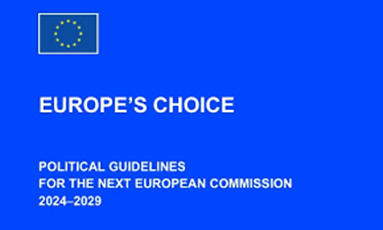18 July 2024

On the 18th of July, Ms. Ursula Von der Leyen, Candidate for the European Commission Presidency, published the Political Guidelines for the next European Commission mandate (2024-2029) entitled “Europe’s choice”.
The Guidelines stress the need for a New European Prosperity Plan that will aim at facilitating business and deepening the Single Market, while building a Clean Industrial Deal and tackling labour and skills’ shortages.
Ms. Ursula von der Leyen agrees to the need of a new approach to competition policy, underlining that the EU will ensure that “competition policy keeps pace with evolving global markets and prevents market concentration from raising prices or lowering the quality of goods or services for consumers.”
To make business easier and faster, each individual will be responsible for reducing administrative burdens and simplifying implementation. There will be a dedicated Vice-President for Implementation, Simplification and Interinstitutional relations and proposals can be expected to simplify, consolidate and codify legislation to eliminate overlaps and contradictions while maintaining high standards. Addressing the current patchwork of national regulations will also be a priority, as this hampers companies performing activities in different EU countries. A new SME and competitiveness check will be introduced to ensure that also future legislation meets the standards of regulatory simplification while preventing unnecessary administrative burdens.
Ms. Ursula von der Leyen will propose a new Clean Industrial Deal in the first 100 days of her mandate. The Commission will propose to enshrine the EU 2040 targets in an updated European Climate law, whereas industries and companies will be supported through the transition by an Industrial Decarbonisation Accelerator Act. Another initiative aimed at accelerating the decarbonisation of the EU economy will be a proposal for the activation and extension of the EU aggregate demand mechanism that should go beyond gas only and include hydrogen and critical raw materials. Finally, the EU will step up its green diplomacy and increasingly engage with third countries on the external aspects of EU climate policy. Apart from focussing on climate change mitigation, climate change adaptation will also be a cornerstone of the next Commission’s political priorities through a European Climate Adaptation Plan.
The Guidelines recognise that European competitiveness is held back by an insufficient diffusion of digital technologies. The Commission will therefore focus on the implementation and enforcement of the digital laws that were adopted during the last term of the Commission (2019-2024). Particular attention will be paid to addressing the challenges related to e-commerce platforms in order to ensure that consumers and business benefit from a level playing field based on the same customs, tax, safety, control and sustainability standards. To accelerate new industrial uses of AI, the Commission will strive to develop an Apply AI Strategy together with Member States, industry and civil society. To this same end, the Commission will also propose the establishment of a European AI Research Council which will allow the pooling of resources in a way similar to CERN (European Organisation for Nuclear Research). The expected European Data Union Strategy is expected to support the development of AI and other cutting-edge technologies, while boosting European companies access to data.
Under the heading “Turbo charging investment”, Ms. Ursula Von der Leyen discloses that she will propose a revision of the Public Procurement Directive which will enable authorities to give preference to European products in public procurement in certain strategic sectors with the aim of safeguarding EU added value as well as security of supply of vital technologies, products and services. In terms of investment, the Commission’s first priority will be to ensure the use of resources available via NextGenEU and the current budget. However, a European Competitiveness Fund, focussing among others on IPCEIs[1], will be part of the Commission proposal for the next multiannual financial framework which should contain a new and reinforced budget.
The new Commission will work towards establishing a Union of Skills. Focus in the area of skills and labour shortages will be on improving education in the science, technology, engineering and maths’ (STEM) fields while giving more prominence to vocational education and training (VET). To that end, the Commission will put forward a STEM Education Strategic Plan and a European Strategy for Vocational Education and Training with the aim of increasing the number of people with a secondary VET degree. To strengthen social dialogue, the Commission aims to deliver on a new Pact for European Social Dialogue in early 2025, together with European employers and trade unions.
Under the new mandate, the Commission will double down on its efforts to fight organised crime which will be targeted in a new European Internal Security Strategy. Europol should become a truly operational police agency as its staff will double over time. Countering drug trafficking will be the centrepiece of the EU’s efforts to make Europe more safe and secure. A new European action plan against drug trafficking will be put forward which should support a wider EU Port Strategy focusing on security, competitiveness and economic interdependence, while building on the ongoing work of the European Ports Alliance.
Infrastructure is a cornerstone of the EU’s foreign economic policy, as the Guidelines vow to take the Global Gateway to the next level. The Guidelines reiterate the EU’s approach to “systemic rivals” which departs from the principle of ‘de-risking not decoupling’.
The Political Guidelines can be accessed here
[1] The first new set of common projects will be proposed in early 2025.













